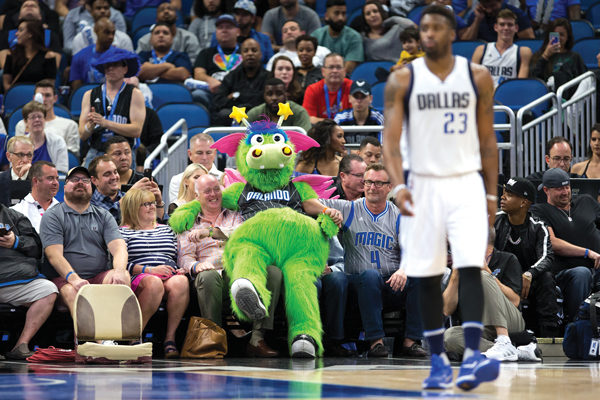After reading a column by Darren Rovell several years ago called the Death of the Season Ticket, I have firmly believed that to be the case. Very few season tickets are used by one consumer to attend all of the games, and in fact, the overwhelming number of season-ticket buyers become ticket re-sellers or brokers. Not in the sense that it is their full-time occupation, but more in the sense that after determining the games that they personally would like to attend, they need to liquidate the tickets that they do not anticipate using. Multiple proprietary studies have shown that utilization of tickets — personally, sharing them with partners or being able to sell or give them away — is a big factor in whether these season tickets are renewed or not. In other words, the biggest barrier to someone becoming a long-term buyer is unused tickets.
So if teams want to concentrate on selling full-season tickets they should begin focusing on developing programs that assist the buyer in turning unused tickets into cash, credits or other assets that are controlled by the team and not encouraging them to go to vendors outside of the team to re-sell their tickets. Why is this important? Because it is in the best interest of the team to maintain the relationship with their consumers rather than sharing that interest which could be minimized or ultimately transferred to a third party. While the secondary market began that way, it is hard to argue that because of their ability to offer a lower price that they haven’t evolved to become the primary market.
Thus I was very intrigued at the Ticketmaster Summit this past summer when the Orlando Magic unveiled a concept they named Magic Money to address the very issues I have presented here.
As an organization that has always valued business intelligence, certain research insights led to the creation of Magic Money and the ability of season-ticket members to return tickets. The Magic determined:
■ Ticket Upgrades: Season-ticket members consistently ranked ticket upgrades as the most preferable way to improve the game-day experience.
■ Resale Challenges: Despite efforts from the Magic to educate season-ticket members on how to most effectively resell their seats on the secondary market, successful ticket reselling continued to be a challenge for many fans due to the changing nature of the ticket marketplace.
■ Schedule Conflicts: Even for the most avid season-ticket members, the intensity of the NBA schedule can be a challenge. Members have tickets to all 44 Magic home games between October and April. Given these schedule demands, it can be hard for season-ticket members to use all of their tickets. Even those planning to come to games often encounter last-minute conflicts that prevent them from attending. In focus groups, season-ticket members often vocalized this challenge and were concerned about losing value from their investment when unable to attend games.
 |
Orlando Magic mascot Stuff will visit your seat through an app transaction with Magic Money.
Photo by: GETTY IMAGES
|
The Magic looked for ways to use technology and their new mobile platform as a solution to remedy these key challenges uncovered by the team’s research. Predictive modeling efforts also identified that overall ticket usage was one of the most predictive variables in determining the season-ticket member’s likelihood to renew. Therefore, the Magic’s aim was to alleviate the burden of the demanding NBA schedule while also allowing members a way to customize and improve their experience by making their investment flexible across all of the team’s offerings.
The concept of Magic Money began to form back in 2014 as a benefit within the Orlando Magic App. Members were able to use a feature within their app to return tickets for Magic games they were unable to attend. Members received a credit for the face value amount of the returned tickets for all returns completed prior to the day of the game and received 50 percent of face value for returns completed on game day, all the way up to game time. This encouraged members to return tickets as early as possible to receive the maximum return and provide the Magic with additional time to resell the tickets. This credit, called “Magic Money,” became a digital currency stored within the app that could be used to upgrade seats at future games.
In its three-year existence, the number of season-ticket members using the option of returning tickets for Magic Money increased from 50 percent in year one to 80 percent in year two and then to 90 percent last season. Fifty percent of season-ticket members returned tickets to games and used Magic Money to customize their game-day experience. This customization provided members the opportunity to use their Magic Money to upgrade seats, add additional tickets to future games, purchase concessions and merchandise items, and access team events such as press conferences and player autograph sessions — all through the mobile app.
What I love about the program is that it works for both parties. The Magic benefit from reselling the tickets at a higher rate; increased spending on the app and the fact that members using the app are 50 percent more likely to renew their tickets than those members not using the app. While the member is able to dispose of tickets for games they do not wish to attend and to sit in better seats when they do choose to attend and also enhance that experience of attending.
A new wrinkle is that the Magic have also begun incentivizing members to return their seats for certain games, by offering members greater than 100 percent face value in Magic Money, where the team recognizes the member’s seats are under-monetized and can be sold at a significantly higher value on the single-game market.
Magic Money is a program that encourages renewal, provides opportunities to sample higher-priced inventory, provides incremental revenue sales opportunities and contributes to growing the Lifetime Value Asset of membership. Maybe it’s more than Magic Money — maybe it’s that elusive Magic bullet?
Bill Sutton (wsutton1@usf.edu) is the founding director of the sport and entertainment business management MBA at the University of South Florida and principal of Bill Sutton & Associates. Follow him on Twitter @Sutton_ImpactU.





